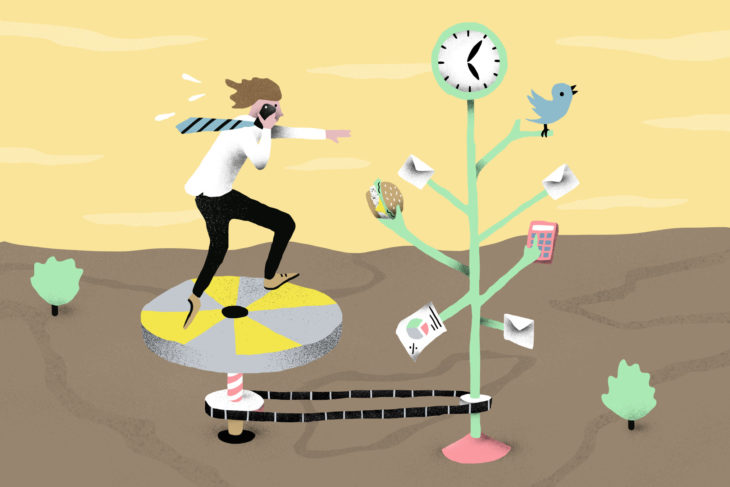Sometimes it feels like no matter where I go or what I do in my downtime, I can never escape the heavy weight of the “shoulds” on my shoulders. I should be getting some work done right now. I should be cleaning the apartment or paying that bill or running that errand. A frame of mind that might just be considered industriousness if it were approached from a healthier angle turns into a warped cycle of expectations and guilt. I have no idea why I put so much stock into this idea of finishing my work “once and for all” so I can let go and have a good time, because as soon as I check a task off my list, a new batch of to-dos will appear in its place. As any busy person knows, you’re never “finished,” and the all-or-nothing approach is about as counterproductive as it gets no matter what area of life you’re applying it to.
When I get caught up in this cycle, the trick that helps me most is an obvious one – removing the emotion from whatever task is in front of me and just doing it to free up more time afterward. Nothing makes me slower at accomplishing a task than going through the exhausting cycle of dreading it, sitting down and gradually working my way up to actually starting it, pausing for a break just five minutes in, spending several minutes steeling myself to dive back in, and repeating the process about a hundred times in the course of an afternoon. Imagining a project as difficult and lengthy will make it exactly that, even if the project could just have easily been quick and breezy.

Source: Woman’s Day
So, how do we remove the emotion and stress from our oh-so-backlogged to-do list? One simple way is to streamline the day so there’s actually more time to accomplish what’s in front of us. This chills out our stress levels a bit and – more importantly – shows us just how much control we have over our lives. After all, we’ll have just proved to ourselves that we have more hours in the day than we thought, and can use them however we want! There’s nothing more motivating than that. Here are some tiny ways to find some extra time, whether it’s a few more hours in the week or just some leftover minutes at the end of the day to unwind.
Contents
1. Handle small tasks right away
If you need to make a three-minute phone call or pay a bill, do it as soon as you realize it needs to be done. If you put it on a list to attack later, it’ll take more time to write down, anticipate and find time for than it does to actually finish.
2. Do one thing at a time
I know we live in a world that preaches the benefits of multi-tasking, but aside from the fact that switching gears mentally to hop between tasks could actually be slowing you down, seeing one task through to completion ensures you’ll definitely have accomplished something that day instead of dragging the same few tasks along with you for weeks on end. When we jump around between projects, it’s easy to find ourselves finishing a day having made progress on lots of things but not having a single finished accomplishment to actually check off our lists.

Source: The New York Times
3. Record how you spend your time
Spend a week journaling how you spend every hour (or minute!) of your day. Yes, this is annoying to do, but I guarantee you’ll be astounded at just where all those hours after work go. The facts aren’t pretty, but they’re key in uncovering where the parts of your week where you can carve out extra time for the things that really matter to you.
4. Discover your biggest emotional procrastination habit
Just as we emotionally eat from time to time, most of us have mindless activities we turn to when we’re stressed or upset. This isn’t necessarily a bad thing, because everyone needs to unwind, but if you’d rather be unwinding in more constructive ways, this is the first habit you’ll want to look at. When I did this myself, I realized that my reflex when trying to unwind after work would be to reach for my laptop, which never actually had a calming effect. What I was really craving was a chance to give my brain a break, but all logging back into the internet was doing was giving it another thing to process. What I really needed to be doing for that effect was exercising or just zoning out, so that’s what I try to do more often these days.

Source: Ideapod
5. Give yourself time limits
Perfectionism can eat up hours of extra time in our day, and a good chunk of the time, it doesn’t even make our work any better! When you have unlimited time to accomplish something, the revisions to your work can be endless. There’s no time for this! It’s not a good idea to carelessly breeze through important tasks, but doing them with a sense of urgency ensures other things will actually get done that day.
6. Plan by the week
Giving yourself a short list of priorities for the week instead of for each day allows you to view your schedule more cohesively and move things around to dates that work for you. This also allows for a chance to find extra loopholes of time in the day!

Img source: fistfuloftalent.com
7. Accomplish things in small bursts rather than marathons
As they say at Unfuck Your Habitat (and probably the entire self-help corner of the internet), it’s better to do things in small, manageable bursts rather than leaving all the work for one massive marathon. For example, lots of us keep our homes clean by letting things steadily accumulate on the floor and surfaces over the course of several weeks and then finally cleaning them up by setting aside three hours on a weekend to really dig in. Wouldn’t it be so much easier to spend five minutes at the end of each day cleaning up just whatever mess was made that day? It doesn’t seem so tempting at first, but it begins to click mentally when you realize that when you follow this routine, you’re always just a few minutes away from a clean home (or an empty email inbox, or being done with whatever other tasks you’re using this method for). That high you feel after completing a marathon project can be felt every day, because you’ll be finishing that project every day!

Source: Goalcast
8. Practice letting things go
This is both the toughest and most important. Sometimes you simply can’t get to everything on your list without losing out on every minute of your day, so what if now and then you just let lower-priority stuff fall by the wayside? The world will not explode. When you let things go, you may miss an email now and then or let a little mess collect in your kitchen, but it’s worth the mental trade-off of knowing you don’t have to be married to your to-do list and that you can free up time in your life for other things. Sometimes the richer experiences in life are just more important than vacuuming.
Original by: Claire Hannum
